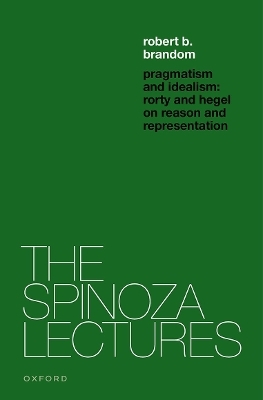
Pragmatism and Idealism
Oxford University Press (Verlag)
978-0-19-287021-6 (ISBN)
During the last decade of his life, Rorty emphasized the anti-authoritarian credentials of his pragmatism. He came to see pragmatism as the fighting faith of a second phase of the Enlightenment. The first stage, as Rorty construed it, concerned our emancipation from nonhuman authority in practical matters: issues of what we ought to do and how things ought to be. The envisaged second stage addresses rather our emancipation from nonhuman authority in theoretical matters.
Brandom shows how pragmatism moves beyond the traditional model of reality as authoritative over our cognitive representations of it in language and thought, to a new conception of how discursive practices help us cope with the vicissitudes of life. Hegel anticipates the challenge to the very idea of objective reality as providing norms for thought which Rorty believed required us to enact a second phase of the Enlightenment. Unlike Rorty, Hegel presents a detailed, constructive, anti-authoritarian, non-fetishistic, social pragmatist account of the representational dimension of conceptual content. At its heart is an account of the social dimension of discursive normativity in terms of reciprocal recognition, and an account of the historical dimension of discursive normativity in terms of a distinctive new conception of reason: the recollective rationality that turns a past into a tradition. His idealism thereby offers a concrete pragmatist alternative to Rorty's global semantic and epistemological anti-representationalism.
Robert Brandom is Distinguished Professor of Philosophy and Fellow of the Center for Philosophy of Science at the University of Pittsburgh, where he has taught since 1976. He received his BA in philosophy and mathematics from Yale University in 1972. His 1977 PhD from Princeton University was supervised by Richard Rorty and David K. Lewis. Brandom is a fellow of the American Academy of Arts and Sciences and of the British Academy. He is the recipient of the Distinguished Achievement in the Humanities Award from the Mellon Foundation and the Anneliese Maier Forschungspreis from the Humboldt Stiftung. He has delivered the John Locke lectures at Oxford University, the Hempel lectures at Princeton, the Townsend and Howison lectures at Berkeley, the Aquinas lecture at Marquette, and the Brentano lectures in Vienna, among others.
Preface
Lecture 1: Pragmatism as Completing the Enlightenment: Reason Against Representation
Lecture 2: Recognition and Recollection: The Social and Historical Dimensions of Reason
Afterword
| Erscheinungsdatum | 16.11.2022 |
|---|---|
| Reihe/Serie | The Spinoza Lectures |
| Verlagsort | Oxford |
| Sprache | englisch |
| Maße | 129 x 195 mm |
| Gewicht | 178 g |
| Themenwelt | Geisteswissenschaften ► Philosophie ► Geschichte der Philosophie |
| Geisteswissenschaften ► Philosophie ► Philosophie der Neuzeit | |
| Sozialwissenschaften | |
| ISBN-10 | 0-19-287021-1 / 0192870211 |
| ISBN-13 | 978-0-19-287021-6 / 9780192870216 |
| Zustand | Neuware |
| Informationen gemäß Produktsicherheitsverordnung (GPSR) | |
| Haben Sie eine Frage zum Produkt? |
aus dem Bereich


